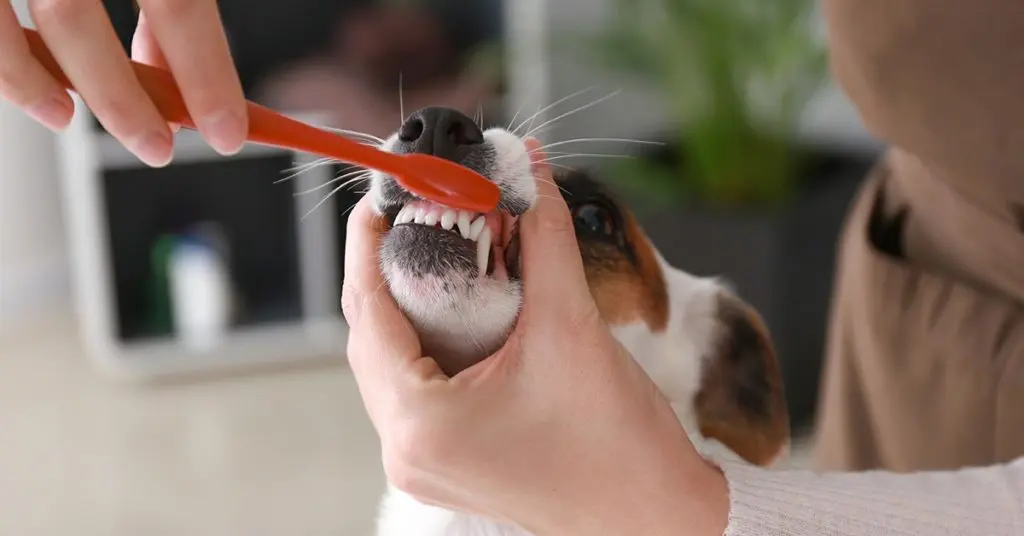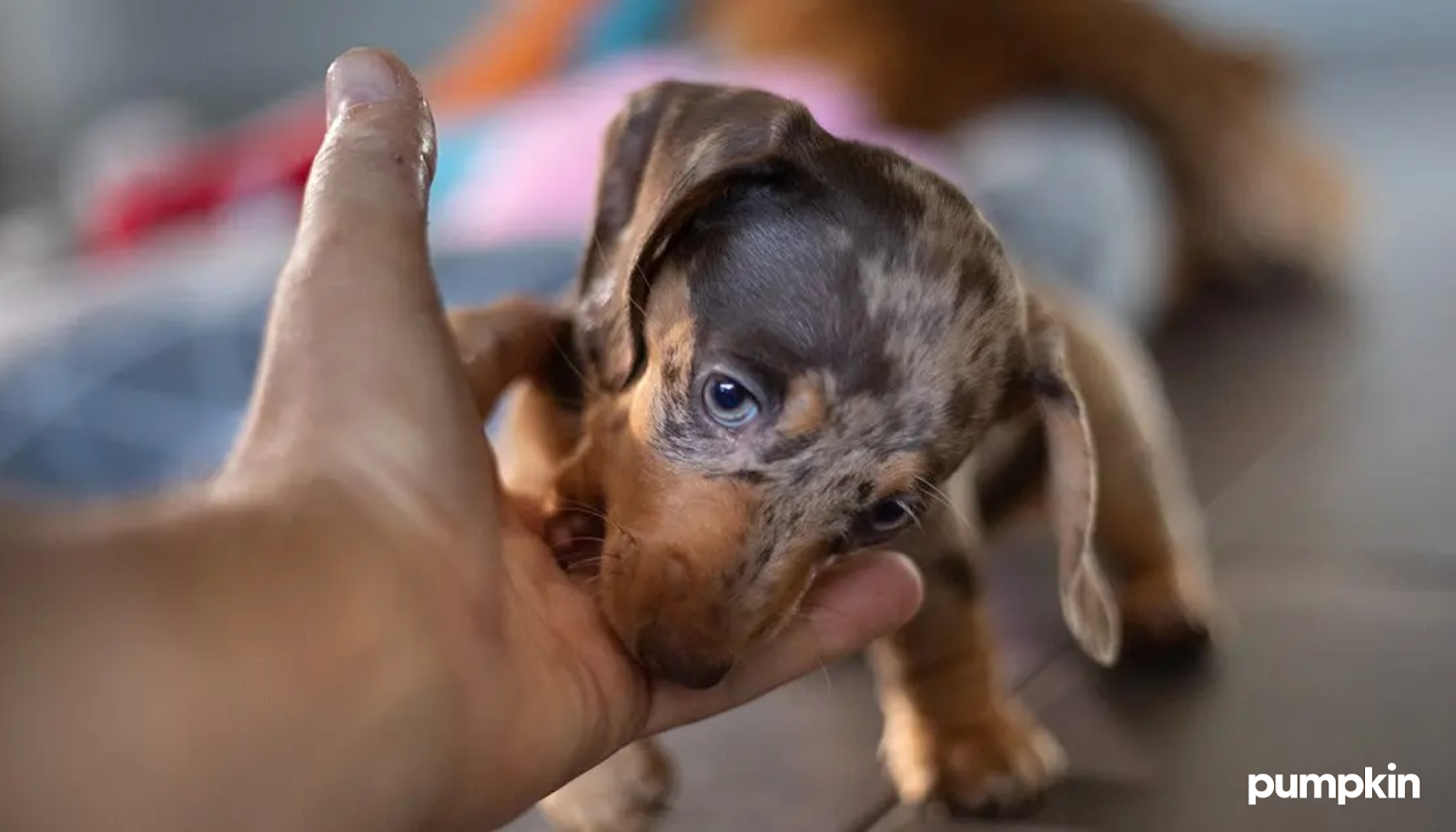Key Points
- Puppies start losing their baby teeth when they’re around 3-4 months old; adult teeth usually finish coming in at around 6-8 months.
- Signs of teething include increased chewing, drooling, swollen gums, and some blood.
- If you find loose puppy teeth on the ground, it’s perfectly normal. If you never find any, that’s normal, too — many are swallowed.
Just when you thought you got the hang of puppy parenthood, the teething process begins. Suddenly, everything in the house looks like a chew toy. But there’s a good reason for all that gnawing — those baby teeth gotta go!
Before you surrender your home to the reign of teething terror, it’s important to learn about this process. Much like human babies, puppies are usually born toothless and then grow a set of 28 puppy teeth. Depending on when you brought your new pup, they may have wagged into your life with a varying number of baby teeth.
So, when do puppy teeth fall out? And better yet — when will the puppy teething phase come to an end?
Here, we’ll cover a typical puppy teething timeline.
When do puppies lose their baby teeth?
Puppies will start to lose their first baby teeth when they’re around 3-4 months old, and between 6-8 months of age, they should have lost all of their baby teeth. They won’t be toothless, though! By the time those baby teeth start to drop, your puppy is already growing their new teeth.
The teething stage doesn’t last long, and before you know it, your puppy’s baby teeth are gone and replaced with a full set of chompers. By the time they’re 8 months old, they should have a total of 42 adult teeth.
Which teeth do puppies lose first?
Dogs have four types of teeth:
- Incisors (for grasping)
- Canines (for tearing)
- Premolars (for grinding)
- Molars (for grinding)
Out of all four of these, puppies lose their baby incisors first around 2-5 months old. Next, they lose their canines around 5-6 months, usually around 3-5 months old. Then, around 4-6 months old, their premolars come out and are replaced by their adult molars.
Tip: Don’t be shocked if you discover your pup’s baby teeth laying around the house! It’s perfectly normal to find a little tooth every now and then. It’s also totally normal if you never find them as many baby teeth are swallowed.
How long does it take for a puppy to lose all of their teeth?
Here is a typical puppy teething timeline to help you understand what’s going on with your pup’s teeth and when. While this is a typical timeline, it’s important to note that every pup is unique.
Some puppies lose their teeth faster or slower than others, and some puppies’ adult teeth even grow in a little funky at first. For example, some puppies’ canines grow in sideways, then straighten out over time. Be sure to check in with your veterinarian to monitor your pup’s progress.

Weeks 2-4
During the first couple weeks of a puppy’s life, their deciduous teeth — or itty bitty baby teeth — come in. The incisors, tiny front teeth, are usually the first to appear. At this point, puppies are still nursing — their eyes are opening, and they’re beginning to explore the world beyond their mother.
Weeks 5-6
In these weeks, the baby teeth finish growing. Puppies have 28 puppy teeth, including canines and the premolars. They will naturally nip each other and chew everything around them during this stage. Nipping actually teaches them bite inhibition, which is their ability to control the force of their bite.
Weeks 12-16
This is when teething begins in earnest, as the baby teeth start to fall out. You might find teeth the size of a grain of rice around the house (or maybe your pup will just swallow them — which is normal).
While the idea of playing tooth fairy may be cute and fun, this is actually the most painful period for your puppy. This is your cue to offer limitless cuddles, puppy teething toys, and frozen treats. The process can take as long as a few months, though it depends on the individual dog.
This is also a good time to start getting your puppy used to having their mouth examined or brushed by gently touching their gums and teeth.
6 months or older
By the time your puppy is 6-8 months old, they should be done losing their baby teeth and 42 adult teeth should be present. If you suspect your pup may still be harboring baby teeth after this time, check in with your veterinarian. Do not attempt to remove stubborn baby teeth yourself.
Again, adult teeth in puppies usually appear in this order;
- 2-5 Months: Incisors
- 3-5 Months: Canine teeth
- 4-6 Months: Premolars
- 4-6 Months: Molars (Missing in puppies)
How to care for a teething puppy
If you’ve experienced a teething baby, know that a teething puppy isn’t far off!
Rather than crying, however, your puppy will want to bite everything in sight — from furniture to your feet. To help redirect their nipping and soothe discomfort, provide them with safe puppy teething toys. You can also try putting their chew toys in the freezer to provide a cooling treat.
If you have a super chewer on your hands, it may be worth investing in indestructible chew toys with tougher exteriors and textures. Just remember that anything that’s as hard as a tooth can crack a tooth, so be careful about which dog toys, bones, and edible chews you bring home.
Frozen treats are another great remedy for teething puppies. Not only are they tasty, but they also help relieve teething pains. To avoid giving your puppy too many treats, mix ice cubes with frozen treats.
Tip: Tip: Did you know that puppies learn about the world through their mouths? If it feels like your pooch is putting everything in their mouth, know that it’s a natural part of puppy socialization.
Puppy teeth and dental disease

Dog dental health is a huge part of puppy care, so when you notice something off, don’t ignore it!
Sometimes, baby teeth and permanent adult teeth can crowd, or you’ll notice plaque buildup that can lead to periodontal disease. Some pet parents also notice baby teeth that are refusing to come out; this can be a sign of retained deciduous teeth, which is common in small-breed dogs.
In order to prevent dental disease and protect your puppy’s health, clean your dog’s teeth with a dog toothbrush and toothpaste as regularly as possible. Start small by simply brushing their teeth with a finger brush and rewarding them with treats along the way.
Tip: In the event of an infection or periodontal disease, having the right pet insurance can help you pay for the best care possible. That’s why Pumpkin’s puppy insurance plans can help cover the costs of some exam fees, X-rays, and treatments for dental diseases. Take a step towards protecting your pup’s pearly whites and get a quote today!
What are some signs that your puppy’s teeth are falling out?
Aside from noticing dog teeth around your house, you might also notice that your puppy seems a bit uncomfortable or that they’re chewing on… well, everything. Don’t be surprised if they start nipping, too. These are all signs your puppy’s teeth are falling out.
Other notable symptoms include;
- Bad breath
- A little drooling
- Little spots of blood on chewing toys (It should be really small, and excessive blood should be cause for concern)
The takeaway: Keep calm and chew on
It’s totally normal and expected for all of your puppy’s baby teeth (or “milk teeth”) to fall out and be replaced with a new set of adult teeth. As mentioned before, the rate at which they fall out can vary. The only time when your dog’s loose teeth become a problem is if they’re losing their permanent adult teeth.
Though it might be shocking to find a puppy tooth on your floor, this is a normal part of your puppy’s growth. While puppy teething can be a rough time for both you and your pup, know that it doesn’t last forever. In the meantime, be sure to stock up on safe chewing toys, cold treats, and don’t hold back on the cuddles!




